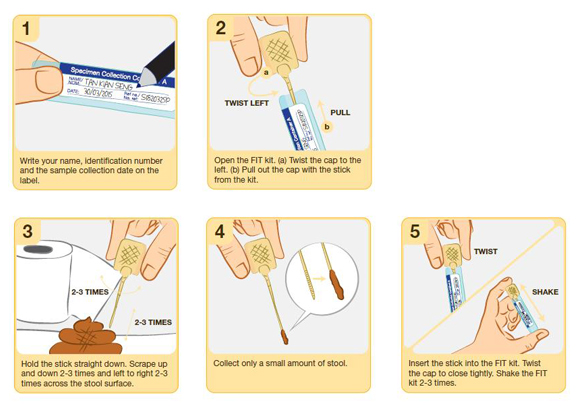Colonoscopy
What is a Faecal Immunochemical Test (FIT)?
It is a test that:
- Detects the presence of small amounts of blood (which can’t be seen with the naked eye) in the stools.
- Is safe, quick and easy to do, and can be done at home, without the need to change your diet before the test.
You will need to collect two stool samples over two days for a more accurate result.
People who are aged 50 years and above, without any symptoms of colorectal cancer, are encouraged to go for FIT once a year.
Why is the test necessary?
Stools may look normal even if they contain small amounts of blood. The test is necessary to detect these small amounts of blood which are usually invisible to the “naked” eye.
Why would there be blood in the stools?
Blood in stools may be due to bleeding in the inner lining of the large intestine. There are many causes of bleeding, for example, polyps, an infection and cancer. To find out more, please speak to your family doctor.
How is the FIT carried out?
Steps 1 to 5 show you how the test should be done.
Do:
- Collect two separate stool samples, each from a fresh bowel movement
- Use a new FIT kit to collect the second stool sample on a different day
- Mail the completed FIT kits within 24 hours from the day of each stool collection
- Store it in a cool and dry place if you are unable to mail the completed FIT kit within the day of the test
Don’t:
- Add water to the FIT kit
- Pour out the water from the FIT kit
- Let water or urine come into contact with the stool sample
- Collect a stool sample if you have diarrhoea or any bleeding conditions such as haemorrhoids (piles) or are menstruating
What happens if the test is positive?
If the test shows a positive result (abnormal), it means that the amount of blood present in your stool is higher than normal. However, it does not mean that you have cancer. Further testing is necessary. Your doctor will advise you on what further tests you may need, such as a colonoscopy.

For further enquiries, please contact our center at 10651.
